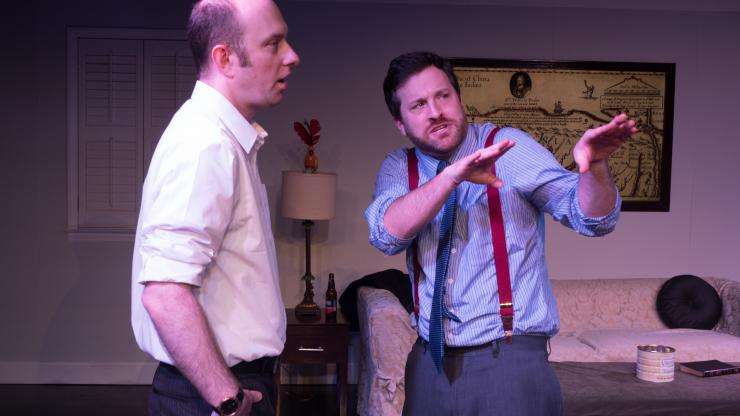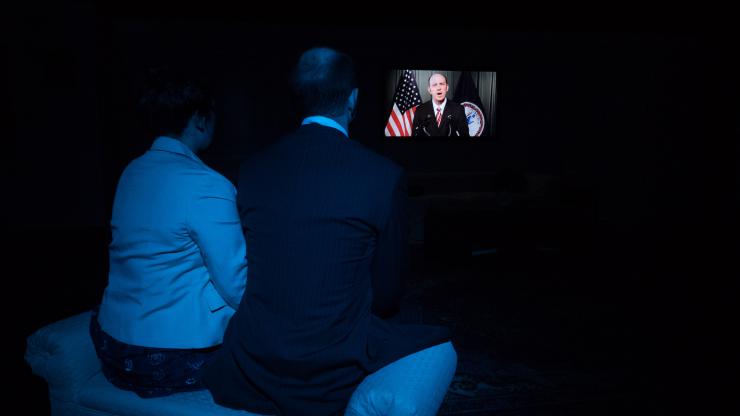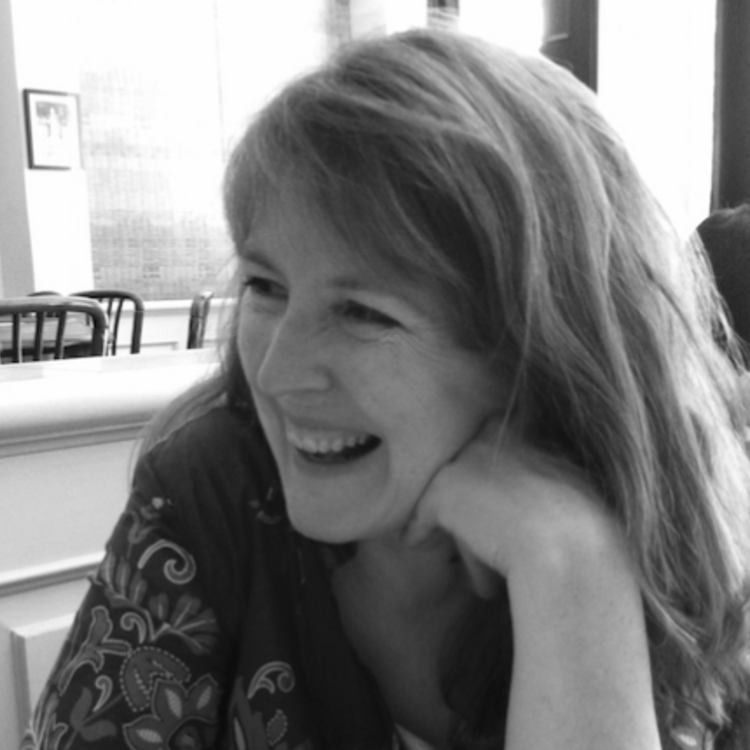Dramatizing Faith in the Post-Trump Era
A Conversation between Director June Guralnick and Playwright Suzanne Bradbeer
June Guralnick: How do we tackle the subject of faith in American plays, when religion is increasingly a political weapon? Directing a recent regional premiere of Suzanne Bradbeer’s play The God Game at Sonorous Road Theatre (Raleigh, North Carolina), my politics scraped against the play’s sympathetic treatment of conservative Christian (Republican) characters. My planning work on the production began before the election; with Trump’s win (and the center staging of Christian right-wing propaganda), I privately struggled with the question whether this was the right time to showcase the play. Over the past few months, Suzanne and I conversed about my conflicted feelings; we hope the ensuing dialogue will be of interest to other theatre artists.
Suzanne, I’d like to start by asking why you wrote The God Game and what core questions you were responding to.
Suzanne Bradbeer: I grew up in what you might call a Christian left home, and the question of faith and how faith is handled in the political arena is certainly part of what inspired me to start this play six years ago. My mother is a person of faith and church is a vital and rich part of her life. My family attended (and still attends) St. Paul’s Episcopal Church in the heart of the University of Virginia (across from Thomas Jefferson’s magnificent Rotunda).
How do we tackle the subject of faith in American plays, when religion is increasingly a political weapon?
June: I’ve struggled to understand what faith means personally—and how faith is used politically both as a tool of repression and a rallying cry for positive social change. Raised by a single mom in an essentially nonreligious household in New York City, I assumed the rest of America was secular. Only when I journeyed South in the late ’80s was this view challenged. Since that time, I’ve been intensely interested in works of theatre that explore faith, and a few years ago wrote Across the Holy Tell—a tragedy about the friendship between an American female soldier (Catholic) and an Iraqi botanist (Muslim) against the fallout of war and religious hatred (workshopped by Burning Coal Theatre Company in Raleigh). Seeking out other plays grappling with faith, after reading The God Game I was super excited to be directing the regional premiere. Suzanne, could you talk about the connection between faith and American politics in your play?
Suzanne: I am fascinated by the push and pull of the public versus private. What do some of these big questions look like behind the scenes? What kind of personal struggle is going on in a family? The God Game is about the moral dilemma faced by a popular Virginia Senator (Tom) when he is asked to compromise one of his most cherished values—that religion and politics should not mix—to gain a bigger prize, and what this dilemma looks like when family (his wife Lisa) and vocation (campaign strategist Matt) are pushing in opposite directions.

June: In the context of 350,000 religious congregations and 56 million weekly worshippers in the US, do you think faith in our society has been a somewhat taboo subject until fairly recently for American playwrights?
Suzanne: It has been an undervalued and unmined subject, or if addressed, too often the “take” can be full of judgment. It’s very easy to have contempt for the Sarah Palins of the world—and for good reason. But faith is a big part of this nation’s identity and for me, why would theatre cut itself off from that conversation?
June: I agree, particularly in light of the 241-year old tug of war in this country between church and state—something The God Game beautifully references. Until this decade, American playwrights generally steered clear of the God arena, with some notable exceptions including early African-American dramas as well as outdoor dramas. Plays and musicals that tackle religion have done so primarily through the lens of satire and caricature (Book of Mormon), scandal (Doubt), rock spectacles (Jesus Christ Superstar), charismatic preacher stories (I’ve lost count how many dramas portray snake-wielding ministers) and recently, a spate of thoughtful plays arising from character conflicts around faith (I would place The God Game in this category).
Suzanne: Regarding The God Game, there has been a consistent (though minority) pushback that has called the very idea that there are reasonable people of faith as “absurd.” When I was in Ashland Oregon for the Ashland New Plays Festival, I had an African-American director for a workshop of the play. And in one of the talkbacks, she told the audience that we need diversity in the theatre in all respects—including politically—characters like these Republicans who are not being made fun of, who are shown in their complicated humanity. June, can you elaborate on your discomfort in bringing to life characters whose views are so different for yours?
June: It wasn’t that I was uncomfortable with your characters per se; from my first reading of The God Game, I admired your writing chops creating vivid, believable human beings. But it was the ambiguous moral/ethical space you created between the characters that I found problematic. The God Game, which asks audiences to equally weigh all sides (and suspend judgment), began to feel naive….like a flower at the end of a gun. A beautiful symbol, but in these troubled times, the gun’s going to shoot and kill someone just the same.
Suzanne: It’s the characters’ relation to the moral/ethical world they inhabit which is what interests me. I also want audiences to see the play without any sort of filter from the writer. Since I come from the left side of center, I felt it was crucial for me to present these characters from the “other” side without judgment—to get it right, or as right as possible. Otherwise, why bother?
June: Isn’t it Pollyannaish to pretend that a writer doesn’t have a point of view? We select characters and choose a particular story…ultimately, our world view is driving the work.
Suzanne: It’s not that I pretend the writer doesn’t have a point of view. It’s that, if I’m an audience member, I don’t want to know the writer’s point of view. I want to be in the story, I want to know the character’s point of view. I don’t want a polemic.
June: Author point of view and polemics are quite different. Great plays typically have points of view. Mother Courage has a point of view; Tartuffe has a point of view. We are talking about the basis of dramaturgy in the creation of a play. In The God Game you successfully create compelling characters. But what do you want the audience to think about—and do—when they leave the theatre? What’s the takeaway?
Suzanne: I want conversations exactly like the one we’re having. Most of America does not go to the theatre. Most of America professes to have a faith. So to the extent that the people in my world—the theatre—can come away from the play taking people of faith, like Lisa, seriously—I think that’s pretty good. And conversely, when audience members say to me, I’m a conservative Christian and this play has made me rethink the way I approach the ballot box—I think that’s pretty good too.

June: People like my father, who are working class (manual labor) with a limited education (and religious by the way), don’t generally feel welcome or comfortable in a theatre and I can count on the fingers of one hand the times he attended a play. So I get exactly what you are saying and I appreciate that you want to portray characters we don’t often see in a play, as well as reach audiences who are not typical theatregoers.
Suzanne: Were you able to suspend judgment for the characters?
I passionately believe that story can change hearts and minds and you don’t do that by telling people what to think. Changing hearts and minds, by definition, is possible only if you’re not already of the same mind.—Suzanne Bradbeer
June: I was clear you wanted audiences to empathize with the characters and I worked very closely with the actors to achieve that. But that was part of the issue for me. We hear a lot of assumptions about empathy today—“if people had more empathy, the world would be a better place”—but empathy contains a broad spectrum of emotions and can lead to a range of responses and actions (some positive, some negative). Recognizing this, theatre artists, (Brecht, etc.) have sought to alter theatre’s audience empathy formula. So, to answer your question—yes, I was able to suspend judgment for the characters in The God Game but I felt manipulated at the same time and complicit in the audience’s manipulation. Taking a conservative Christian character such as Lisa seriously is important—but then what? Do you think impartiality is even possible in these times?
Suzanne. I passionately believe that story can change hearts and minds and you don’t do that by telling people what to think. Changing hearts and minds, by definition, is possible only if you’re not already of the same mind. I believe in theatre’s potential to nudge and challenge and question and hold a mirror up to our world, yet a challenge for this play is that it requires people who are mostly left-leaning to produce it, while a significant part of the audience I’m interested in reaching is right-leaning. I was told of an artistic director at a LORT theatre who said (speaking of a different play) that he would not even look at a play where Republicans were shown to be complicated, nuanced people.
June: Excommunicating certain types of characters from our stages is certainly not the answer! How we contextualize a particular character’s ideas is what’s critical. Your character Tom’s agnosticism in The God Game, for example, is contextualized around Thomas Jefferson’s interpretation of the Bible.
Suzanne: Jefferson fascinates me for many reasons. I grew up in his “nabe,” and I worked as a guide at Monticello when I was in college. And of course it was Jefferson who articulated that there should be “a wall of separation between Church and State.”
June: Playwright secret revealed! The Jefferson references truly help illuminate the play’s themes. Suzanne, what I realize is that my internal conflicts are less about The God Game and more about my desire to have a new dramaturgy for American plays that can speak to these cataclysmic times. I believe the core questions are the same for both of us: How can theatre change minds—and whose minds are we trying to change? After Trump’s election, my own faith about what audiences are capable of seeing when they peer into theatre’s reflective glass was significantly challenged. I fear people now see only what their media-infused, mental tape loop plays back.
Suzanne: I think social media and 24-hour news cycles “trump” up our differences.
June: I have to ask, since you wrote The God Game pre-Trump era, and obviously we're in radically different times, would you change anything in the play?
Suzanne: I wouldn’t change the characters or the events of the story as it unfolds, but I might add a bit more of a nod to the polarized (offstage) world these folks are living in.
June: We created a media environment for the Raleigh production to do just that, integrating historical and contemporary imagery and footage, with monitors surrounding the audience on all sides as well as being placed on stage. Neill Prewitt (our videographer extraordinaire) and I termed these moments “interventions” with the purpose of contextualizing/framing what was happening on stage.
Suzanne: I wish I could have seen that.
June: I love that The God Game tackles the subject of faith and our dialogue these past few months has helped crystallize my contradictory feelings directing your moving play. As I was working on our article, I contacted Association for Theatre and Higher Education (ATHE) Religion and Theatre Focus Group, and Roy Brooks-Delphin (group secretary) wrote back. In his response, he quotes author Anne Lamott, and her words continue to resonate. “Faith includes noticing the mess, the emptiness and discomfort, and letting it be there until some light returns.” Current plays about faith, including The God Game, are, by their very nature, a messy business (which is as it should be). A question that remains unanswered for me as I stare into the precipice of American religious bigotry and intolerance, is how should our dramatic tunnels be built so audiences can approach the light?
Suzanne: Anne Lamott is one of my favorite writers. And to the quote you cite and the conversation we’ve had, I say, “Amen, sister.”













Comments
The article is just the start of the conversation—we want to know what you think about this subject, too! HowlRound is a space for knowledge-sharing, and we welcome spirited, thoughtful, and on-topic dialogue. Find our full comments policy here
As a far-left Episcopalian who teaches directing, I must admit to feeling some discomfort about June's directorial viewpoint and " interventions." I think the role of the director is to interpret the play -- especially a premiere -- according to what is in the text without providing commentary. June mentions "Mother Courage" (yes, although Brecht's statements about his intentions are very different from what he actually wrote) and "Tartuffe" as having viewpoints, but if one is looking for a playwright whose viewpoint is not obvious, one need look no further than Shakespeare. I think our societal problem comes from the tendency to view the Other as somehow less than human -- that is a problem for both left and right, and one that will create havoc in our society if it continues. Theatre can either reinforce or dismantle polarization. Perhaps we should take that power seriously, as Suzanne seems to be doing.